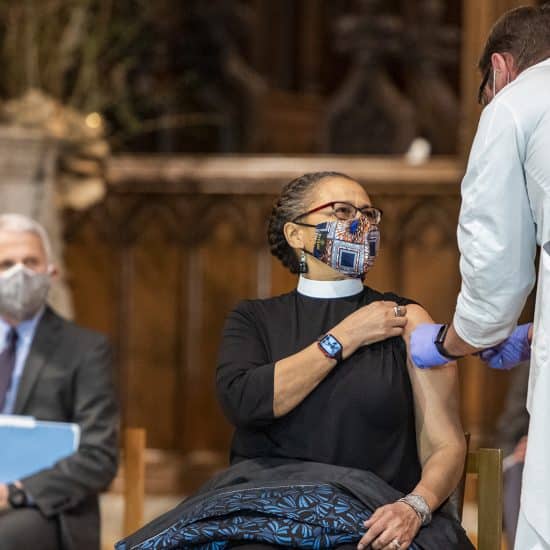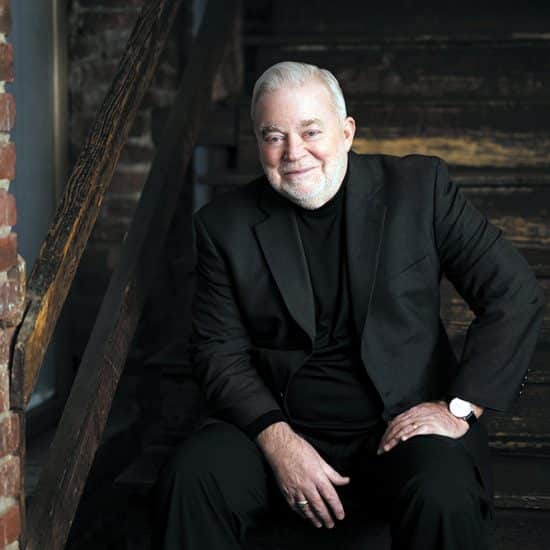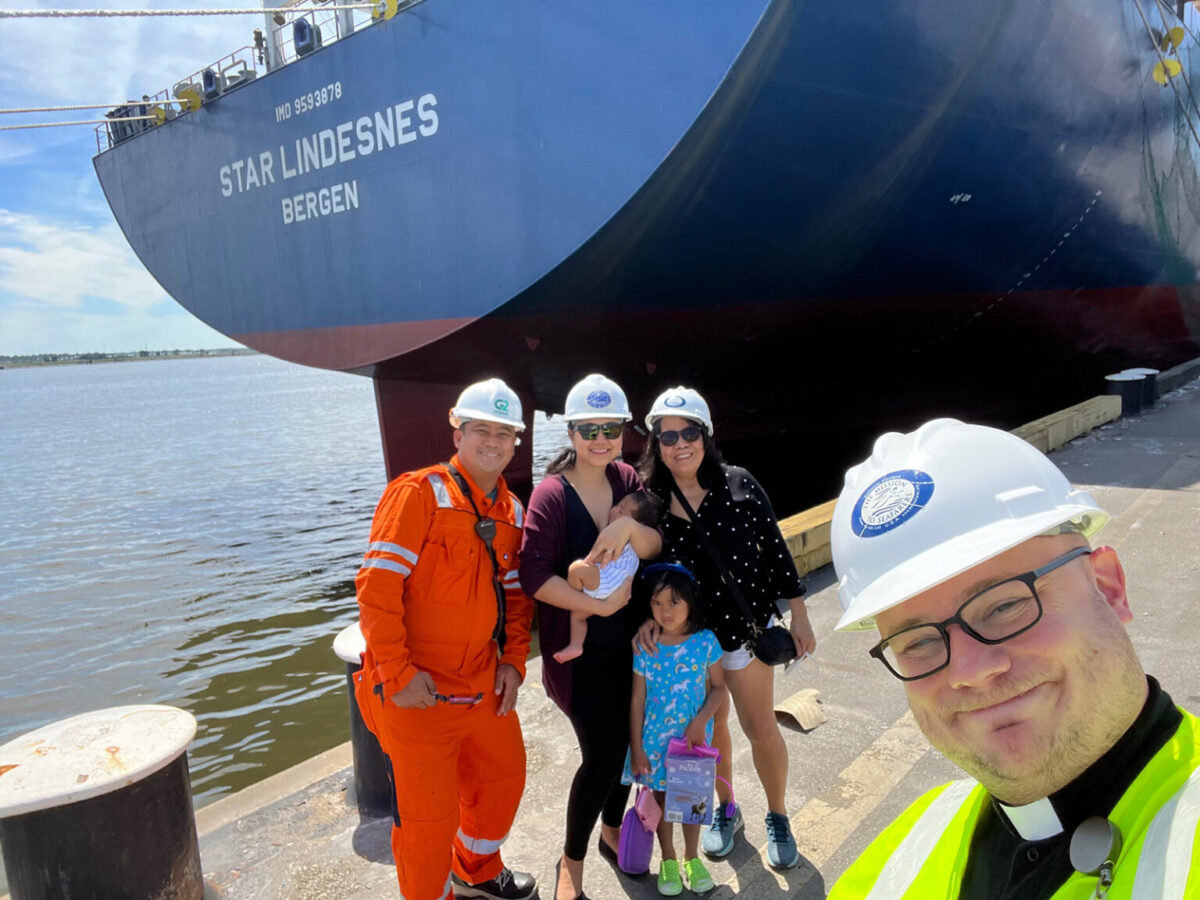
(RNS) — Day in and day out, ministers to seafarers spend their times on the docks of Baltimore, delivering Bibles, magazines, and a friendly face during a ship’s usually brief time in the busy port.
But, with the collapse Tuesday (March 26) of the Francis Scott Key Bridge, the mission of two ministries has shifted to longer-term aid for the crews of the Dali ship that struck the bridge and seven other large vessels stuck in the port for the foreseeable future.
The leader of one of the ministries, the Rev. Joshua Messick, said he will be advocating for the rights of those crew members, including that they have adequate provisions and that their shore leave is not restricted.
“My primary focus will be on caring for those seafarers who cannot continue their journeys,” said Messick, an Episcopal priest and executive director of Baltimore International Seafarers’ Center. “Just making sure they have everything that they are supposed to have and everything that they need to make their extended stay here as pleasant as possible.”
Andy Middleton, a lay Catholic ecumenical minister who directs the other ministry, the Archdiocese of Baltimore’s Apostleship of the Sea, has been communicating via WhatsApp with a couple of the crew members on the Dali, who remained on the ship, which is still entangled with bridge debris.
“I’ve been reaching out to them periodically since (Tuesday) morning, just to check in and make sure everybody’s still doing OK, reminding them that we’re here for them and that we’re praying for them,” he said, “and making sure that they know that when they eventually get clear of the incident and come back to a berth that we’ll still be here, waiting for them and wanting to help them.”
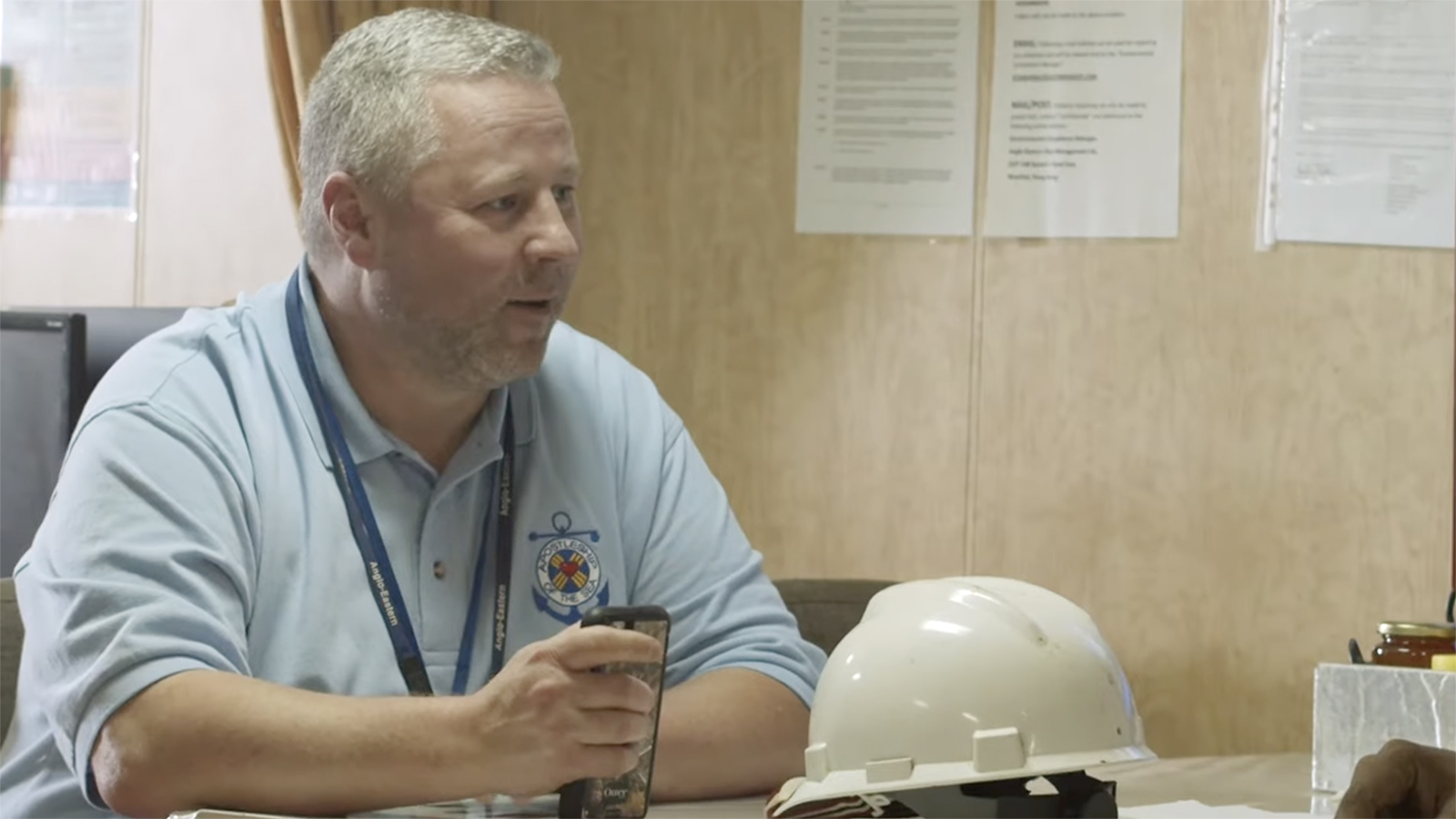
Andy Middleton, director of the Archdiocese of Baltimore’s Apostleship of the Sea, meets with seafarers. (Video screen grab)
Their work with the crews comes as federal, state, and local officials grapple with a complicated set of problems, including clearing bridge debris, getting ships back into the port, and rejiggering a sprawling supply chain that ranges from cruises to coal to cars — and, eventually, rebuilding the bridge that spanned the Patapsco River.
Maryland Gov. Wes Moore spoke at a Wednesday news conference, where it was later announced that the bodies of two of the six people who had been missing were found. He acknowledged the words of kindness and the prayers from around the world.
“To everybody who is sending out those prayers I want to say that we have felt them and we’ve been comforted by them,” he said. “We’re also going to need your support. The collapse of the Key Bridge is not just a Maryland crisis. The collapse of the Key Bridge is a global crisis. The national economy and the world’s economy depends on the Port of Baltimore.”
As the officials work to help the wider population affected by the crisis, Messick and Middleton say their teams continue to focus on the particular needs of those who are at its ground zero. For example, providing familiar food to the stranded Indian crew.
“One of my first thoughts is once the crew gets back into a berth, maybe having a dinner of Indian food cooked and then delivering it to the vessel,” said Middleton, who works with six volunteers. “The cook doesn’t have to cook a meal for the entire vessel. He can take a break and everybody can sit down and eat together.”
Messick’s center, which includes a Lutheran and a Baptist chaplain and volunteers, is affiliated with the global Mission to Seafarers.
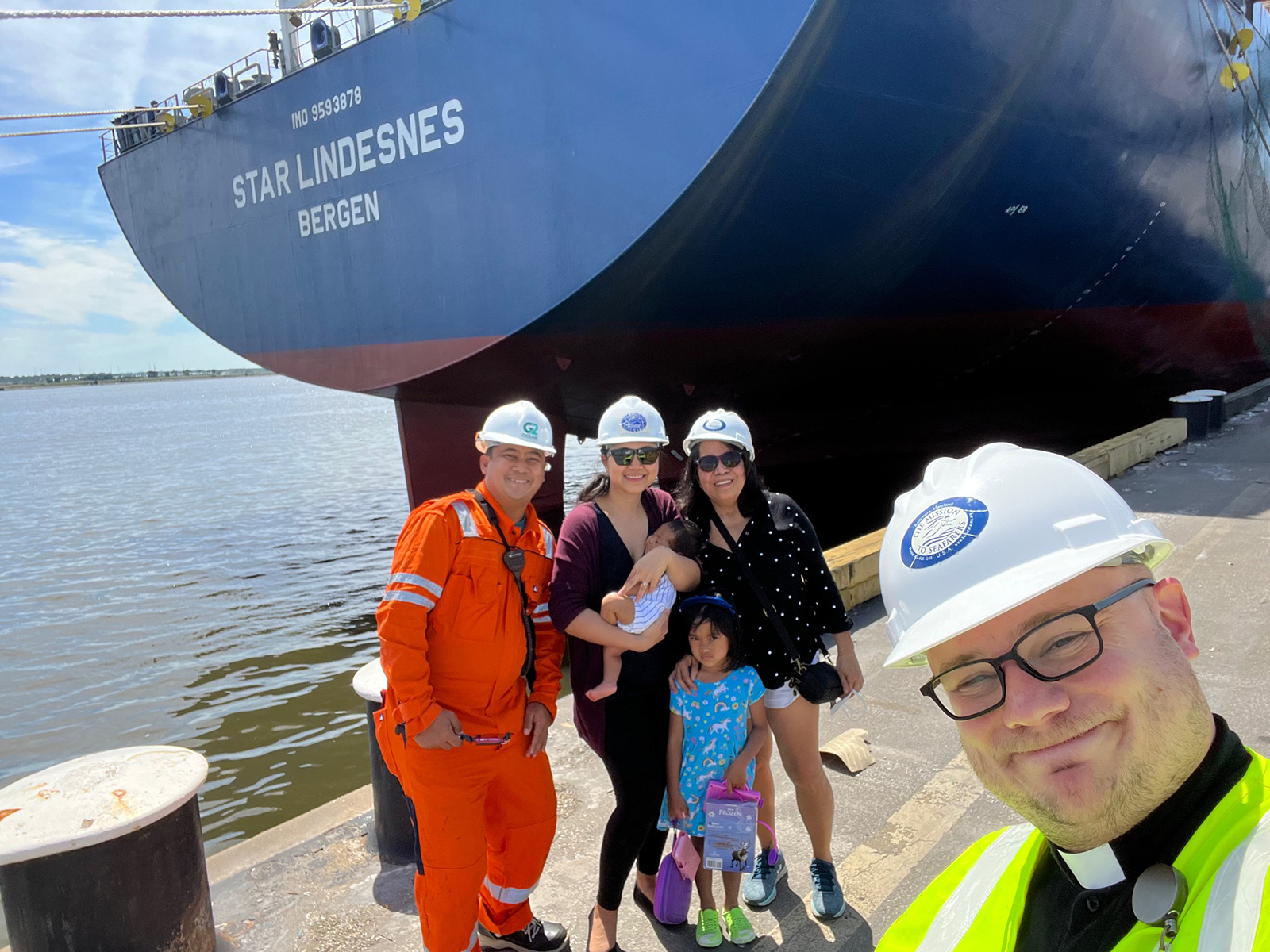
The Rev. Joshua Messick, right, executive director of the Baltimore International Seafarers’ Center in Maryland, takes a selfie with a seafarer and his family. (Photo courtesy Joshua Messick)
Although their work is not always focused on faith, he said his team had administered ashes on Ash Wednesday and taken palms to seafarers since Palm Sunday. Their usual plans to take Easter candy to ships will be truncated to the eight now remaining in the harbor. They also try to meet the needs of seafarers when they “express a religious desire outside of our lane” by providing resources or getting a clergyperson of their faith to visit them onboard their ships.
Messick hopes to work to fulfill requests for Holy Week and Easter, but on Wednesday it was too soon to receive them, he said.
“Everyone’s still kind of rattled and trying to figure things out,” said Messick, who also has Bibles “in every conceivable language” to distribute upon request.
“Once the second shoe drops and people realize they’re going to be here for a while, then we’ll get more of those requests.”
The Baltimore ministries are two of 55 maritime ministry agencies affiliated with the North American Maritime Ministry Association, which has about 100 member chaplains, according to its website. Both are tied to larger organizations that have served men and women who work at sea for more than a century.
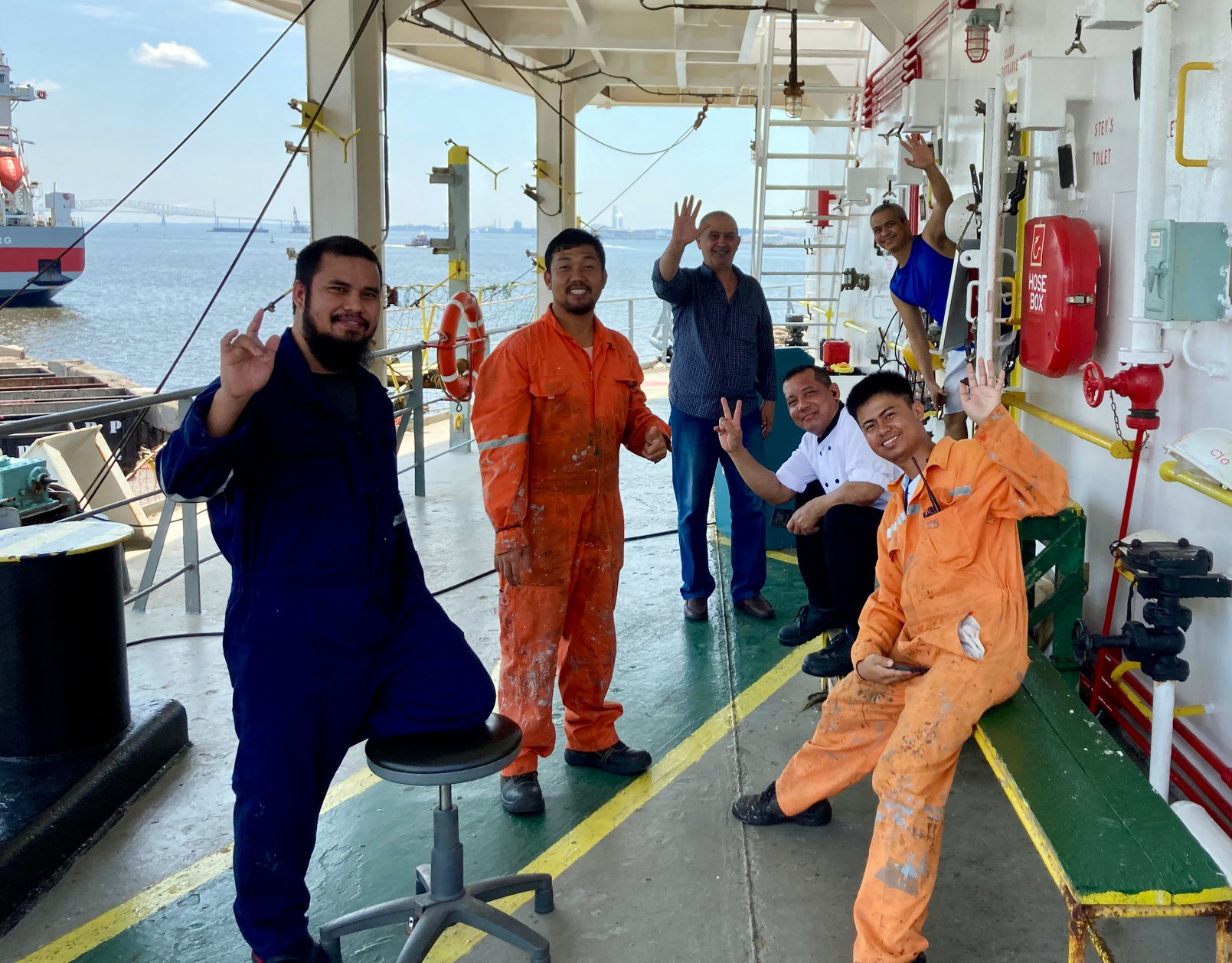
In this undated photo, a crew of seafarers aboard their ship docked at the Port of Baltimore in Maryland. The Francis Scott Key Bridge is visible in the top left of the photo. (Photo by Maggie Schorr)
The people aided by these ministries live a rough life, under monthslong contracts, made even tougher by the circumstances for those in Baltimore now.
“It’s not a 9-to-5 job,” said Middleton, who read from the Book of Isaiah at a Mass on Tuesday remembering the victims who had been on the bridge. “It’s not like the military, where you can take leave to go home for a wedding or a birth or a death in the family. When you sign on, you’re there for the duration of your contract, barring a health emergency or something that would make you unfit for duty.”
Messick, whose team has climbed gangways to visit the stuck seafarers, said the crew members now in Baltimore are in a new phase of uncertainty, especially since those who do not have a U.S. visa and a shore pass cannot depart from their ships.
“The seafarers are used to working through the unknown kind of situations ‘cause they’re at the mercy of the tide and the weather,” he said. “They’re used to delays also if a ship is at the berth that they need to get into. They have to wait until they can get in. What they’re not used to is being in one place for this long.”
Wendy Cadge, a Brandeis University professor of sociology who is an expert on chaplains, said these kinds of ministers play a crucial role, especially for seafarers who may never touch land.
“They humanize the work for the seafarers,” said Cadge, co-author of the forthcoming book “Chaplaincy and Seafarers: Faith at Work.” “Customs looks at the goods and the Coast Guard looks at the vessel, but no one necessarily cares to or attends to the seafarer.”
U.S. Transportation Secretary Pete Buttigieg told reporters at a White House briefing on Wednesday that it was “too soon to venture an estimate” for when the port would reopen.
Messick said he has assisted seafarers in the past when, on occasion, a ship has been abandoned in the port, but nothing compares to this “once in a lifetime” crisis.
“Thankfully, that doesn’t happen too often, but we’ve had ships that were abandoned in Baltimore for a year,” he said. “That’s care of one crew. This is going to be care of eight for a considerable period of time.”

